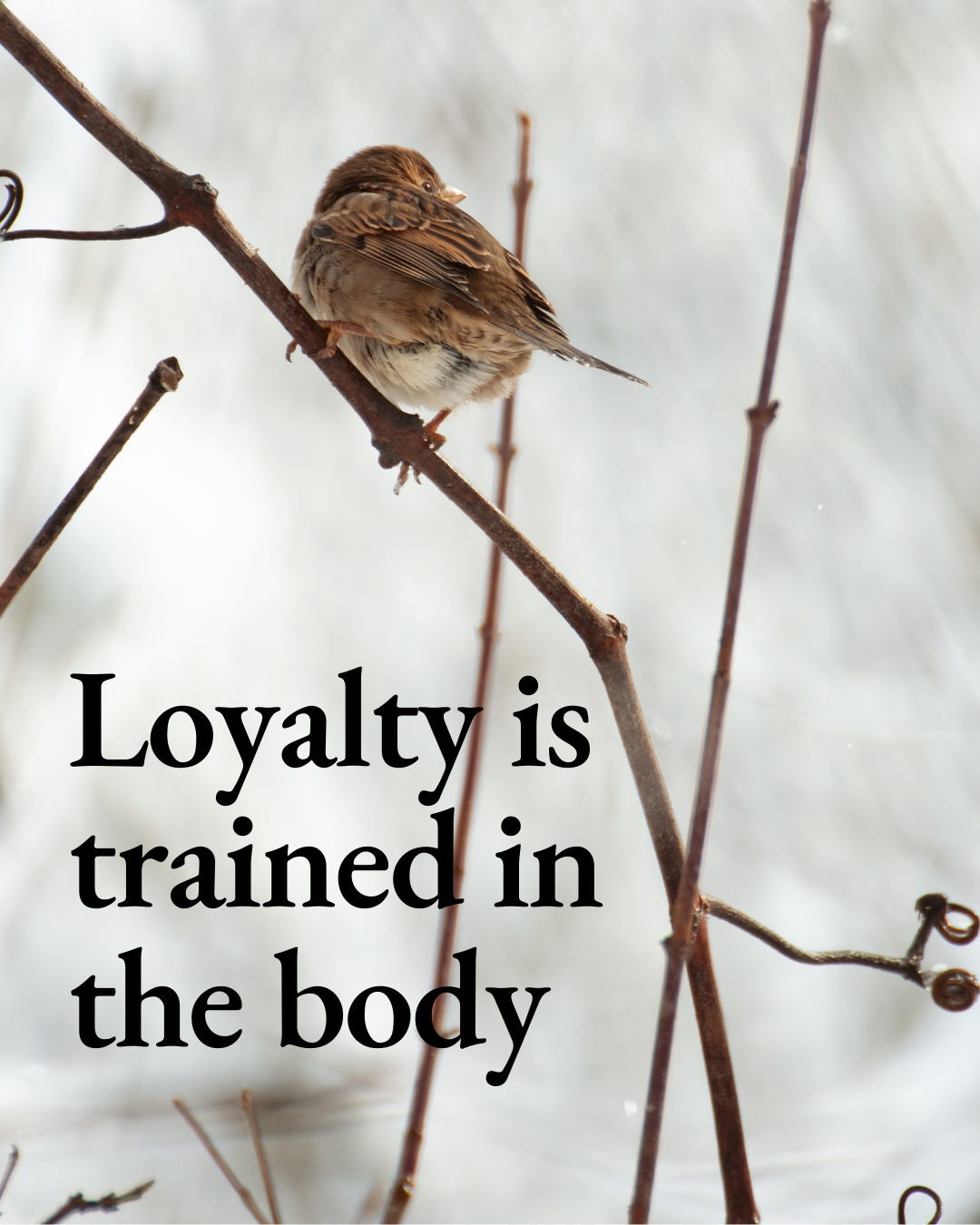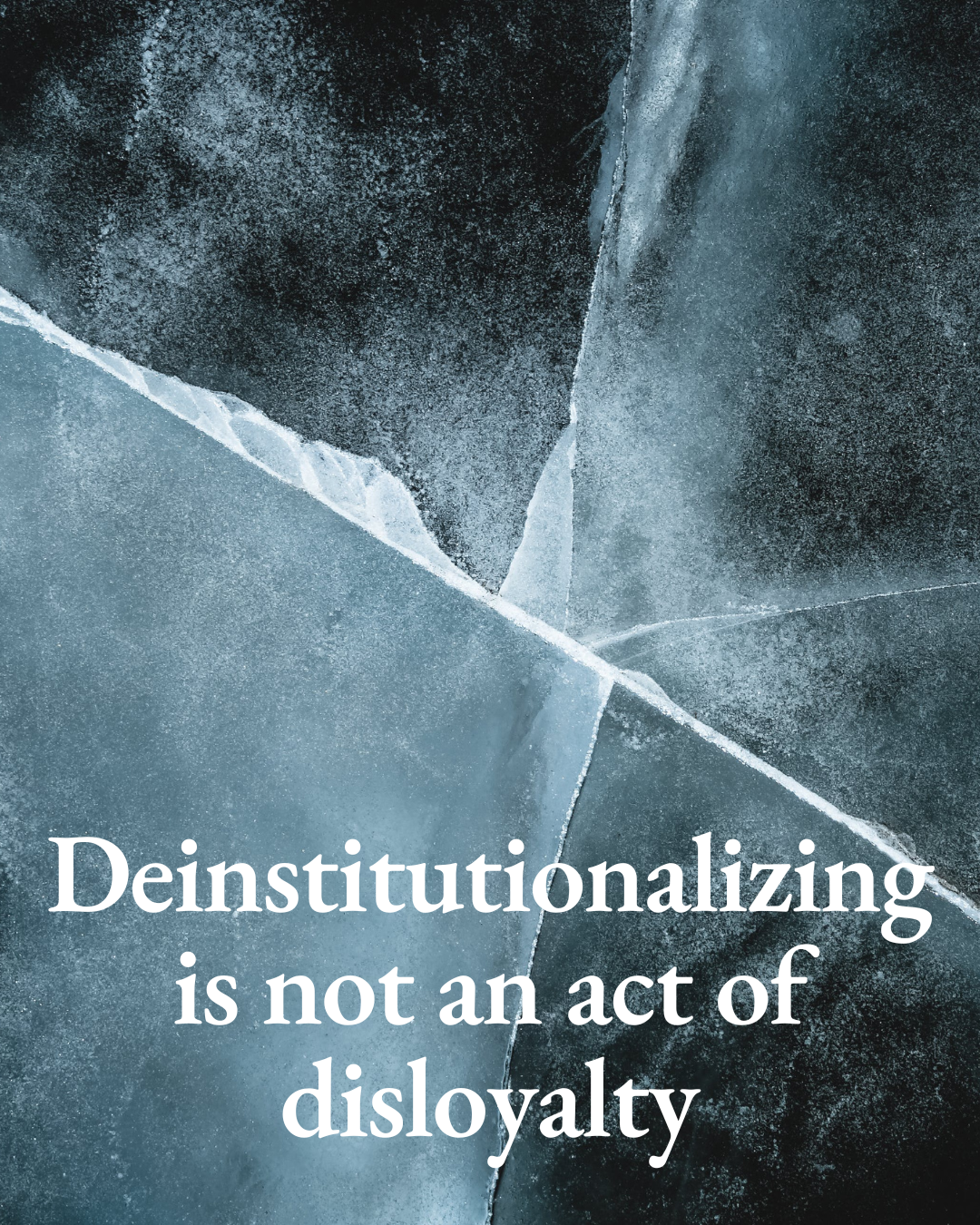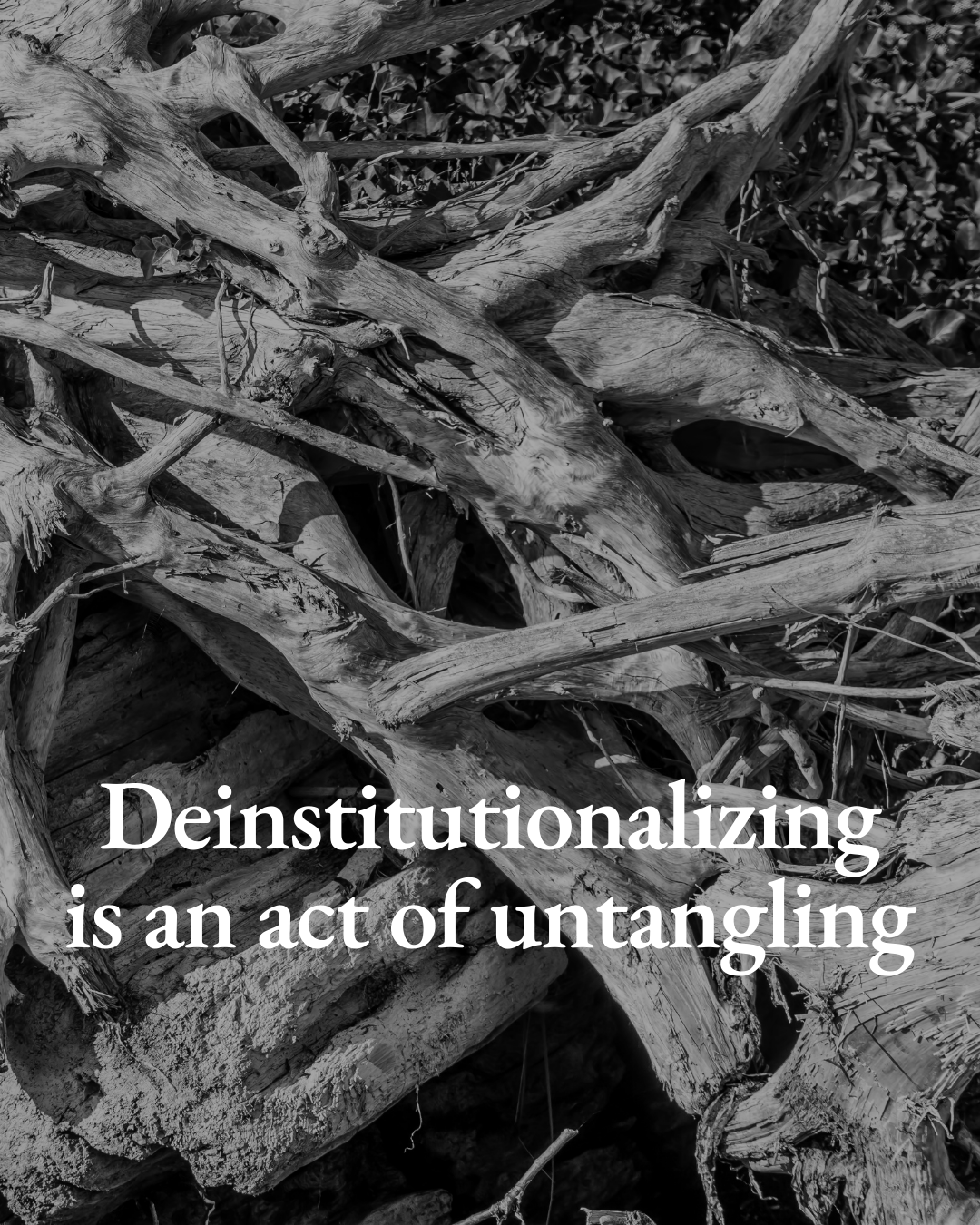
Loyalty is trained in the body
Institutions shape our schedules and outputs. But well before that (and in order to control those), they train our nervous systems and bodies. I can’t tell you how many times I hear (usually) less traumatic stories from folks of how they’ve also learned to override their bodies’ needs in order to not interrupt a meeting or class.
Time and time again, institutions and systems teach us: Safety comes from belonging. In order to belong, you’ll have to override your nervous system and body’s needs.
Deinstitutionalizing is not an act of disloyalty
You don’t have to leave your job to deinstitutionalize (unless you want to).
Relief came across so many people’s faces as I shared that in our first Grove workshop on Naming the Spell of Institutions.
When new clients show up asking me if they should stay or go, my go-to question is: What could open up if you change your relationship to your career first or simultaneously?
If you deinstitutionalize while you’re in your current job, you can decide to stay, go or ___ from a place of clarity rather than panic.
An antidote to January’s New Year Illusion
Here we are committed to January, whether we like it or not. It took me a good week to transition from winter break into routined weekdays.
It has me thinking (again) about how sometimes the season of our lives lines up beautifully with the natural seasonal cycle. And sometimes, maybe more often than not, it doesn’t, not at all.
Especially inside service and knowledge-work spaces - academia, corporate Q1 culture, solopreneur hustle. These were never designed to honor seasons, bodies, or regeneration. Only output, with a thin sprinkle of “self-care” on top.
December and January are the clearest examples of this misalignment.
Deinstitutionalizing is an act of untangling
2026 is the year to reclaim all the parts of yourself that have been stuffed inside institutional walls, propped up by the “good worker” you were trained to be. At the root of it all lies the meta-myth: that your worth, identity, belonging, and selfhood must be defined by the institution.
When you read this concept, what do you notice for yourself? What thought immediately came up? What shifted in your felt sense of body? Did an emotion rush over you? Curiosity? Excitement? Massive resistance to continue? Hold all of that and keep reading.
Deinstitutionalizing is not a one-time act. It’s a living pedagogical praxis, unfolding seasonally, continuously.
2026: The Year to Deinstitutionalize (Even from within institutions)
If 2025 were a metaphor, it might look like a dumpster fire, aka, super messy, stinks, chaotic, and at times overwhelming. And yet, as the smoke and sparks settle down temporarily from their roar, moments of clarity, growth, and real accomplishment reveal themselves and are worth honoring.
In the second half of 2025, many of us have been working on embodied boundaries. You’re learning to notice when you’re overing, where you want to reclaim your agency, and how to keep showing up in ways that align with your values rather than default expectations. Here’s your pause and reflection to honor all those very things…
A more personal note
I know it’s a holiday week. I also know you’re still checking your email, so of course, this is the perfect time to share a more personal note. (Plus an announcement at the end to help make sure next holiday season you are NOT checking your email. 😉)
Here I am again at the edge of another year older this week. This time last year, I shared I was rewriting my birthday “rules” through the lens of deinstitutionalizing, the time I first used the word in an actionable way in this newsletter. But this really roots back years before, in the long process of self-healing and designing containers to hold the healing of others.
Overing is costing your leaders more than you think
Jamie, a director, rushes off one call, jogs down the hallway, and flings open a bathroom door. Then she jogs back to her office and hits Join Now just as she sits down. You hear her breathless apology:
“I’m so sorry I’m late.”
It’s two minutes past the hour. She’s apologizing for having a human body.
This is overing culture perpetuated by an organizational leader. It’s the compulsive yes, the over-explaining, the over-performing, the body-erasing. It’s what happens when leaders push so far beyond capacity that they disassociate from their own needs in order to keep up. Thus signaling to others unwritten and unhealthy expectations.
Wintering is a practice of seasonal planning
I’m not a do-as-I-say kind of person. I do this boundary clarity work alongside you. And as I’ve been designing 2026 content and new offerings (sneak peak at the end), I’ve revisited what boundaries I need on my calendar in order to make some big plans happen. Setting boundaries isn’t about restricting yourself from the things you actually want, enjoy, or value.
Boundaries are about making sure you don’t self-sabotage your plans!
Your leaders are exhausted. Presence can change that.
It’s the end of the year, and most leaders I talk to have been running on empty since mid-year. They’ve juggled expectations (including their own very high ones), absorbed organizational pressure, and pushed past their capacity time after time. And while they continue to perform, the cost is clear: declining clarity, reactive decision-making, and disconnection from themselves and their teams.
Organizations need leaders who can show up with a type of grounded presence and a deeper connection to others.
Rituals to Winterize Your Boundaries
Winter is coming, and I don’t know about where you live, but it finally feels like it here in Colorado. We’re in that threshold transition time between equinoxes and solstices. And with it comes the invitation to slow down, turn inward, and honor the rhythms your body and mind crave. But in the rush of deadlines, meetings, and holiday obligations, it’s easy to lose touch with your energy and overextend.
This is where mini rituals come in. We played around with this idea last week in The Grove's monthly workshop, and I’m excited to share some nuggets from our conversations.
Leading with Presence: New Program Announcement
I started in leadership development back when emotional intelligence and servant leadership came on the scene. I taught undergrad leaders from the original James Kouzes and Barry Posner Leadership Challenge book. We all survived Y2K, yet we would suffer through the fashion of low-rise, bootcut jeans paired with baby tees. Not all have aged well since my graduate school years.
What’s been steady, though these years, has been my commitment to helping leaders navigate careers and organizations that were never built for folks who look and lead like them.
Get Ready to Winterize Your Boundaries
Shifts are all around us. The daylight is shortening and the temperatures are dropping. With every season transition there lies an invitation (okay, sometimes it feels a bit more forceful) for our bodies and minds to slow down.
Where is this seasonal shift guiding you?











